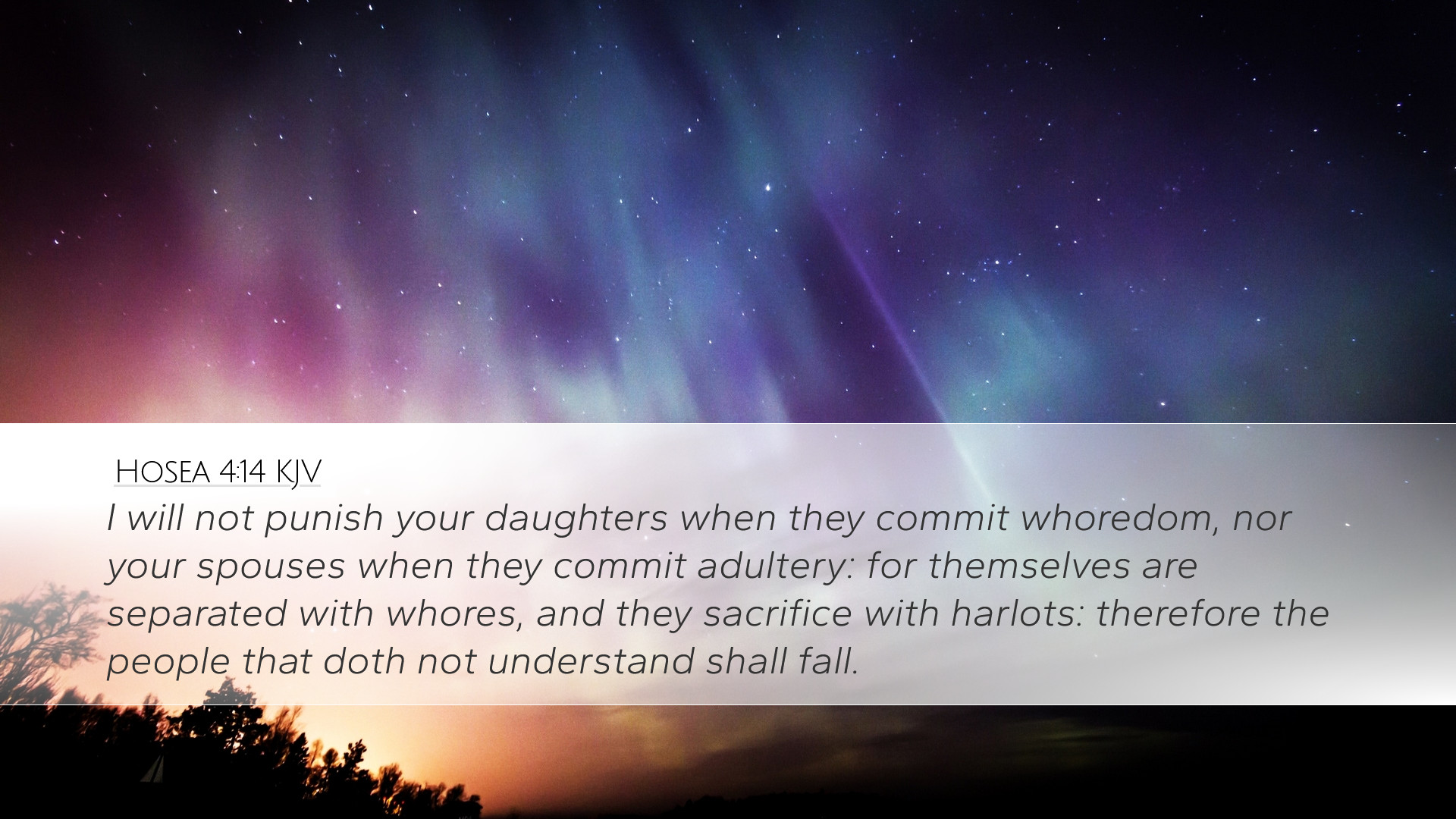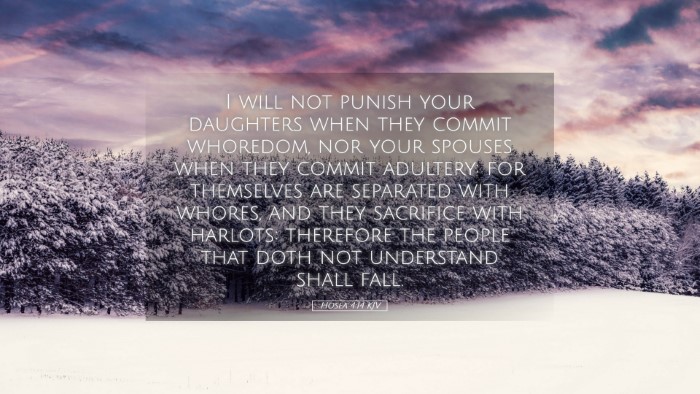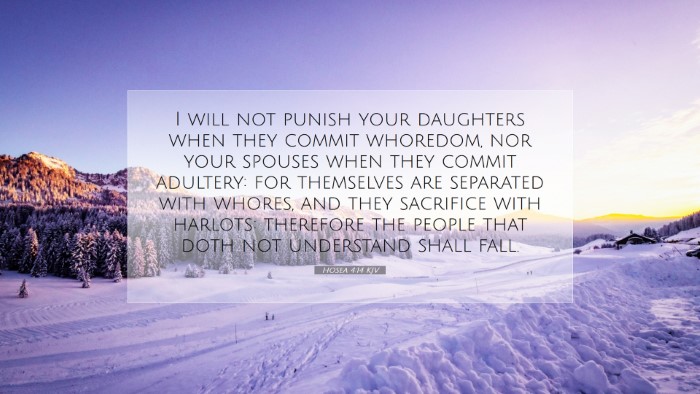Old Testament
Genesis Exodus Leviticus Numbers Deuteronomy Joshua Judges Ruth 1 Samuel 2 Samuel 1 Kings 2 Kings 1 Chronicles 2 Chronicles Ezra Nehemiah Esther Job Psalms Proverbs Ecclesiastes Song of Solomon Isaiah Jeremiah Lamentations Ezekiel Daniel Hosea Joel Amos Obadiah Jonah Micah Nahum Habakkuk Zephaniah Haggai Zechariah MalachiHosea 4:14
Hosea 4:14 KJV
I will not punish your daughters when they commit whoredom, nor your spouses when they commit adultery: for themselves are separated with whores, and they sacrifice with harlots: therefore the people that doth not understand shall fall.
Hosea 4:14 Bible Commentary
Bible Commentary on Hosea 4:14
Hosea 4:14 states: "I will not punish your daughters when they commit harlotry, nor your brides when they commit adultery; for the men themselves go apart with harlots and offer sacrifices with a ritual harlot; therefore, people who do not understand will be trampled." This verse presents significant insights into the consequences of Israel's spiritual infidelity and the nature of divine judgment.
Contextual Overview
The book of Hosea is a profound figure of God’s relationship with Israel, using the metaphor of marital unfaithfulness to depict idolatry and spiritual adultery. In this context, Hosea 4 critiques the moral decay prevalent in Israelite society, particularly emphasizing the roles of both men and women in this degradation.
Analysis of Key Themes
- Divine Judgment and Human Behavior: Commentators note that God’s reluctance to punish the daughters for their actions underscores the larger societal complicit attitudes. Matthew Henry emphasizes that while women are not absolved from guilt, the focus is on the systemic issues stemming from male leadership in the community that lead to such moral failures.
- Spiritual Adultery: Adam Clarke points out that the term "harlotry" is a metaphor for idolatry. This narrative makes it clear that while the act of idolatry is condemned, the men who engage with prostitutes symbolize the leaders' own betrayal of God. The text reveals that God’s people engage with foreign gods and practices, resulting in their moral decay.
- Understanding and Spiritual Insight: The phrase "people who do not understand will be trampled" indicates a lack of spiritual discernment leading to dire consequences. Albert Barnes explains that ignorance of God's laws and commands leads to ruin, as the people partake in sinful practices without recognizing the severity of their actions.
Commentator Insights
Matthew Henry reflects on the societal norms that accept and normalize such immorality. His commentary suggests that leaders fail to guide their congregations towards righteousness, allowing sin to flourish unchecked. He highlights the danger of collective moral failures that lead to the ruination of society as a whole.
Albert Barnes elaborates on the juxtaposition of judgment and mercy. Despite the pervasive idolatry, God’s call to repentance remains. Barnes suggests this indicates the depth of God’s grace, even amidst pervasive sin. The implication here is that understanding and returning to God would avert judgment.
Adam Clarke further connects the passage to the overarching theme of covenant unfaithfulness. He suggests that the whole community shares culpability, indicating a corporate responsibility among the Israelites for national transgressions. The judgment depicted in this verse can serve as a stark warning to both leaders and the community about the consequences of turning away from God.
Theological Implications
The theological implications of Hosea 4:14 are significant for contemporary readers. It challenges pastors and theologians to examine issues of idolatry and immorality within their congregations. The verse serves as a poignant reminder of the relationship between societal practices and divine expectations. Understanding this connection compels leaders to foster environments of accountability and righteousness.
Practical Applications
- Encouraging Spiritual Discernment: There is a profound need for spiritual leaders to cultivate discernment within their communities. This can involve teaching the importance of understanding Scripture to recognize and resist cultural pressures that may lead away from God's will.
- Addressing Corporate Sin: The passage stresses the collective nature of sin. Hence, churches must engage in practices that promote communal repentance and restoration. This entails acknowledging failures and addressing them collaboratively to move toward healing.
- Focus on Leadership Integrity: As leaders are often the ones who set the tone for moral behavior, this text serves as a challenge to pastors and elders to strive for purity in personal and corporate spiritual practices, understanding that their actions can lead the flock astray or guide them towards righteousness.
Conclusion
Hosea 4:14 is a sobering reminder of the consequences of turning away from God. By providing insights from respected commentaries, this discussion encourages a deeper understanding of the themes of divine justice, human accountability, and the necessity for repentance and restoration in light of spiritual and moral failures. For pastors, students, and theologians, this passage offers critical reflections on the nature of sin and the grace that calls us back to fidelity with God.


